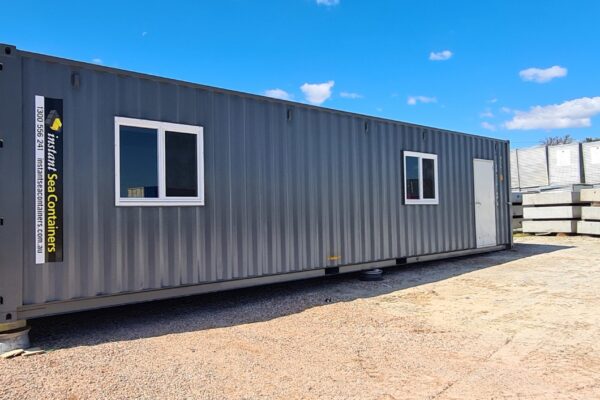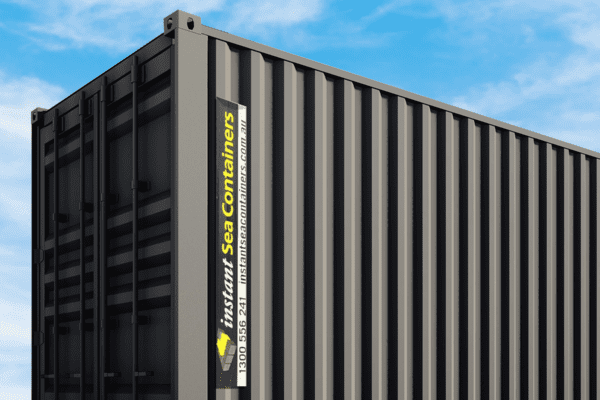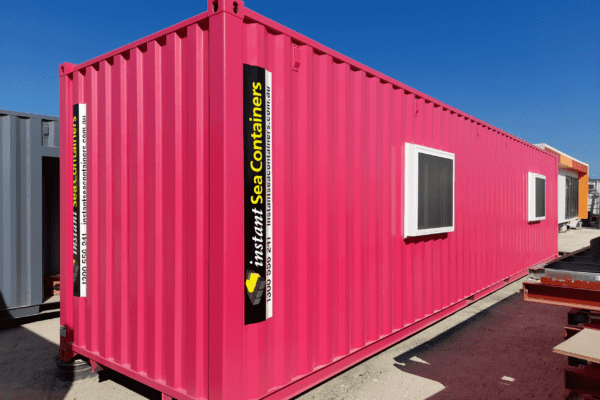New shipping containers are known for being robust steel structures designed to protect travelling goods, often repurposed as modular structures – but exactly how much can they handle – are shipping containers waterproof, fireproof, and airtight?
Table of Contents
Amid the harsh weather conditions, the constant battering of salt water, and the relentless gusts of wind, how do these metal containers protect the goods inside? The answer lies not just in their structure, but also in their potential for modification and transformation.
The Impact of Weather Conditions on Shipping Containers
Mother Nature has a big impact on the condition of a storage container. Rust, a common result of persistent rain and wind, can compromise the waterproof and airtight capabilities of these steel structures. It’s crucial to understand your shipping container’s environment and the weather implications of it to help prolong its lifespan and protect it from damage.
Shipping Containers: Built to Brave the Elements
Fresh from the factory, a new shipping container is built to withstand the elements. These steel structures, designed to safeguard goods while journeying thousands of miles across turbulent seas and strong winds, are inherently robust. But does this robustness guarantee they are waterproof, airtight or even fireproof? Let’s find out.
Are Shipping Containers Waterproof?
While all shipping containers offer a degree of water resistance due to their corrugated steel structure, they may not necessarily be waterproof. Consider the distinction between water-resistant and waterproof similar to how an umbrella can resist light rain but may not withstand a torrential downpour.
It’s also important to note that waterproof and watertight are two different things. Watertight means that no water can get in altogether, whereas waterproof implies that there won’t be any damage due to water.
The key to understanding the water resistance of a shipping container is to examine its construction and condition, particularly the caulking and seals around doors.
The Caulking Conundrum
Caulking plays a crucial role in making a shipping container waterproof. The seams of the container doors are sealed with caulk, which, when in good condition, is indeed waterproof. Over time, however, this caulking can deteriorate, possibly resulting in water damage if it eventually leads to leaks.
Ensuring Your Shipping Container is Waterproof
Ensuring a watertight shipping container requires vigilance and regular maintenance. Inspect for signs of rust, damaged seals or other indications of wear. Spotting any small holes or damage early can keep your container waterproof and in good condition. If you plan to modify your container, it’s essential to ensure that these changes won’t compromise your container’s waterproof integrity.
Steps to Waterproof a Shipping Container
Waterproofing a shipping container involves several steps. First, examine the roof, which often bears the brunt of harsh weather. Look for rust and damage, and consider applying a waterproof membrane or a weather-resistant coating for added protection. Container doors require special attention too. Ensuring they close properly and the door seals are intact is crucial to maintaining the interior dry and free from water damage.
Are Shipping Containers Fireproof?
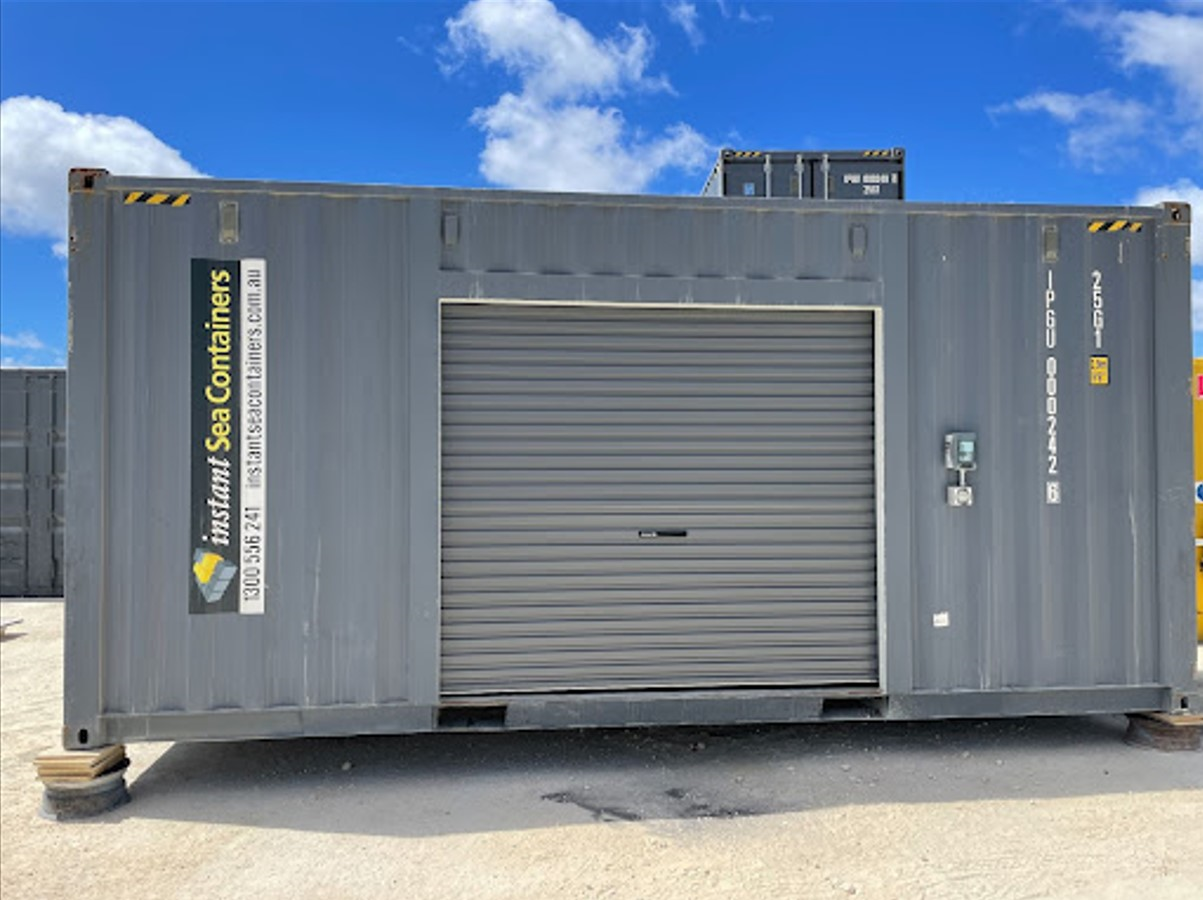
Another common question pertains to the fireproof nature of shipping containers. While marine-grade CORTEN steel, or weathering steel, they’re made from are fire-resistant materials, the containers themselves are not entirely fireproof. High temperatures sustained over a prolonged period can warp or melt the steel, and the wooden floors found in standard containers can catch fire.
Fire Safety Precautions for Shipping Containers
Fire safety is another aspect where shipping containers can benefit from modifications. For instance, swapping out the standard wooden flooring for a metal one can reduce the risk of fire spreading and boost its fire resistance rating. Fire-retardant paints, while not making the container entirely fireproof, can also provide an added layer of protection to your container walls.
A Closer Look at Fireproof Coatings and Treatments
There are an array of fireproof coatings and treatments available that can help bolster your container’s fire resistance. One option is an intumescent paint, a special type of coating that expands when exposed to high temperatures, creating a protective barrier that offers fire protection by safeguarding the steel underneath.
Fire-retardant varnishes and sprays can help mitigate the risk of flames spreading through your floorboards or other contents. Available in sprays or varnishes for different fabrics and woods, they slow down the spread of fire, providing crucial additional time for firefighting efforts.
Are Shipping Containers Airtight?
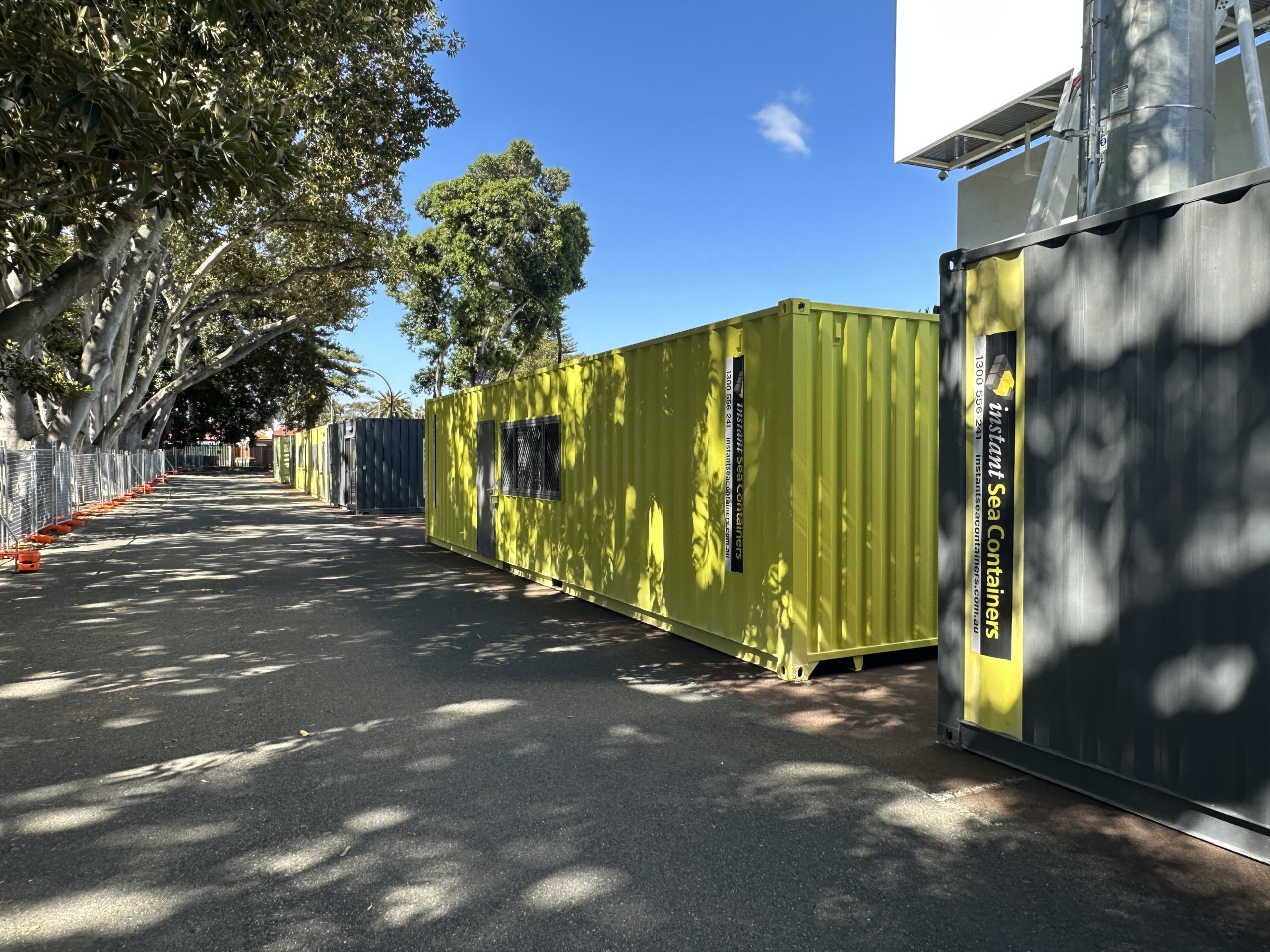
While we’re exploring the protective attributes of shipping containers, it’s worth examining their air-tightness. Standard shipping containers are not airtight. They usually have vents to allow for air movement and to prevent the build-up of condensation. However, if you need an airtight environment, modifications can be made to achieve it.
The Art of Ventilation in Airtight Containers
Ventilation in a sea container is crucial to maintaining air quality inside, especially if the container is being used as a working space. The key lies in a good ventilation system that can control the humidity and prevent condensation, helping to maintain a comfortable environment within.
Airtightness and Its Impact on Container Lifespan
Airtightness isn’t just about controlling the internal environment, it’s also about container longevity. By making your container airtight, you effectively lock out moisture, thereby preventing the build-up of rust. This small step can go a long way in ensuring your storage container stands the test of time, weather, and elements.
Tips to Make a Shipping Container Airtight
While shipping containers are not inherently airtight, certain modifications can help. The journey begins with insulation. Whether you opt for spray foam or structurally insulated panels, they need to be correctly fitted to seal off potential air leaks.
Upgrading the door seals is another key component to improving its airtight properties. While these steps require a bit of work and investment, the long-term benefits in terms of energy efficiency and container lifespan are substantial.
The Dynamic Nature of Shipping Containers
Shipping containers, these steel behemoths crafted for the harsh realities of sea travel, bring an impressive level of resilience. Initially, they might not be entirely waterproof, fireproof, or airtight, but with the right knowledge, care, and modifications, we can make sure these shipping containers are waterproof. Their potential lies not just in their current state, but their capacity for transformation—be it for storage, construction projects, or commercial spaces. These steel shipping containers are more than just boxes; they are versatile platforms, waiting to be tailored to your unique needs.
Using a specialist designer and manufacturer for your shipping container conversion is the best way to ensure your next project is waterproof, properly ventilated and fire-resistant. If you’re looking to transform a simple steel box into a reliable, waterproof, fireproof, and potentially airtight solution that fits your unique needs, look to Instant Sea Containers.
With over 20 years of experience in the construction of shipping containers and other portable solutions, we understand the intricacies involved and know how to turn these steel boxes into resilient, versatile commercial spaces. We’ll help you navigate every step of the process, from waterproofing and fireproofing to airtight modifications and more. Learn more about our range of commercial sea containers, or contact one of our friendly and experienced professionals at 1300 556 241 today.
For those in Perth seeking durable and versatile sea containers, Instant Sea Containers is your go-to source. With over two decades of expertise, we specialize in transforming steel boxes into waterproof, fire-resistant, and customisable solutions. Whether for storage or unique commercial spaces, our team at 18 Rogers Way, Landsdale WA 6065, is ready to assist. Contact us at 08 9415 0720 or for 24/7 customer support at 1300 464 214. Discover our range of shipping containers today.
Frequently Asked Questions
Can shipping containers withstand harsh weather conditions?
Yes, shipping containers are designed to brave the elements, including harsh weather conditions, thanks to their robust steel structure. However, their resistance to weather can vary based on maintenance and modifications.
What makes a shipping container waterproof?
Shipping containers have a degree of water resistance due to their corrugated steel structure and caulking around doors. Regular maintenance is crucial to ensure a waterproof shipping container.
Are storage shipping containers waterproof?
With storage containers it’s important to remain extra vigilient to the wear and tear of your shipping container, as damage or rust may create weaknesses that allow water to creep in. Given the storage container has minimised wear and tear as well as following our recommendations in the blog you will minimise the chance of water seeping in.
Are all shipping containers fireproof?
While the CORTEN steel used in shipping containers is fire-resistant, the containers themselves are not entirely fireproof. Modifications, such as applying fire-retardant paints or replacing wooden floors with metal, can enhance their fire resistance.
How can I make a shipping container airtight?
Standard shipping containers are not airtight but can be modified to become so. This involves adding insulation, improving ventilation systems, and upgrading door seals to prevent air leaks.
What are the benefits of modifying a shipping container?
Modifying a shipping container can enhance its waterproof, fireproof, and airtight properties, making it more suitable for various uses, from storage to commercial spaces. It also extends the container’s lifespan by protecting it from elements.

Managing Director at Instant Sea Containers
Scott Rawson is the Managing Director of the Instant Products Group, a specialist group of companies that offer portable building solutions, including sea containers, transportable offices, and portable sanitation products.
